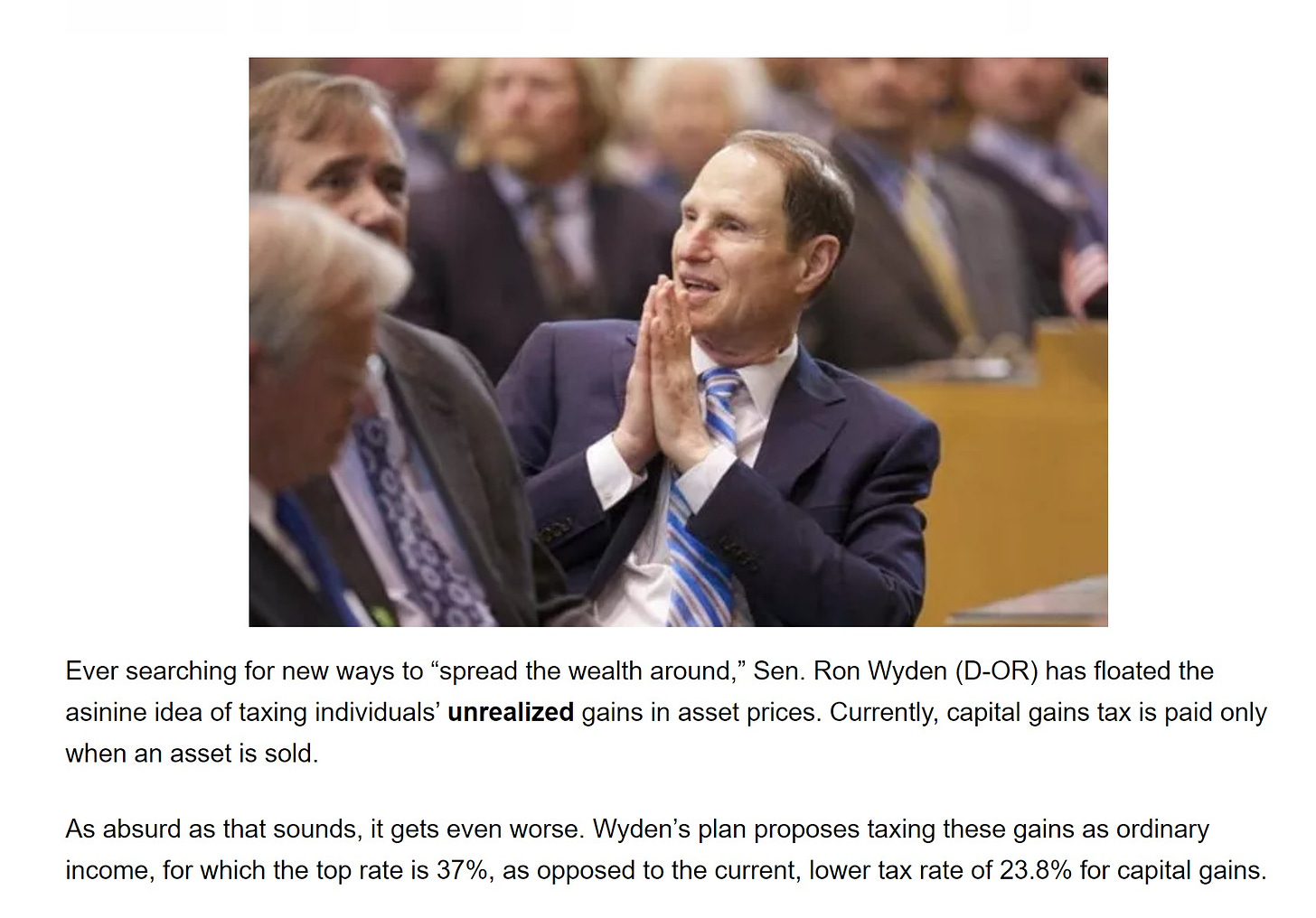moore v united states: the most important case you've never heard of
forget taxation without representation, this is income tax without income.
as SCOTUS winds down its session this year, a seemingly abstruse case whose ramifications may be profound pops as one to watch next term (commencing in october).
at issue is a serious question:
can you be made to pay income tax on income you never received?
because if you can, this opens all kinds of floodgates of novel tax ideas like “unrealized cap gains” or “undistributed corporate income.”
here’s the frame:
The Tax Cuts and Jobs Act of 2017 (TCJA) specifically affects multinational enterprises (MNE). Under the TCJA, U.S. corporations are subject to a one-time, mandatory deemed repatriation tax on undistributed and deferred post-1986 foreign income
“mandatory deemed repatriation tax” is just saying “we’re going to retroactively look at the profits earned by a foreign entity that you own a share of and then act as though (deem) those profits were dividended to you in the US and charge you tax accordingly.”
it is, quite literally, an income tax on income you never got. retained cooperate earnings are being ascribed to you despite never being transferred to you.
and if they can do this, then they can tax all manner of unearned and undistributed income.
this is the thin end of a wedge that could get VERY thick indeed.
from redstate
this seems a well chosen and sympathetic plaintiff.
the argument looks to center around the word “income.”
16th amendment:
The Congress shall have power to lay and collect taxes on incomes, from whatever source derived, without apportionment among the several States, and without regard to any census or enumeration.
“income” has, since the time the first income taxes were levied, always been defined as money paid and realized. it does not apply to unrealized or undistributed income (except as parts of specific/specialized pass through corporate structures like S corps)
eisner v. macomber settled this in 1920.
“the amendment (16th) applies to income only, and what is called the stockholder’s share in the accumulated profits of the company is capital, not income.”
this is just basic sense and the taxation of unrealized gains is a nightmare in every form and application.
apply it to public stocks and you have to pay for the price rise even if you do not sell. what then happens if the price falls again? does the state send you a check? that way madness lies.
it’s 1000 times worse for founders. the more successful your company becomes, the more you must sell and so you lose control. if the company is private, it’s not even clear how you CAN sell. there is no market for shares.
what happens to the budding tech titan when he owns 30% of his dream, does a round of funding that jumps its valuation from $10 million to $50 million, and suddenly owes taxes on $12 million in unrealized equity gains in a private company? that’s going to be $2.9 million, paid in cash. (20% LTCG +3.8% obamacare surcharge and you have not even paid state taxes yet) under plans mooted to count this is normal income, the figure would be more like $5 million owed.
what founders or entrepreneurial ecosystems will be able to survive this? hell, what corner store in a rising neighborhood could?
will they apply this to home prices so you’ll need to take out a HELOC to pay the taxes on your house if it appreciates in price?
this will literally make inflation into a taxable event.
it’s a clearly insane idea. but it’s what’s coming if this case is lost or unresolved as the always awful 9th circuit already ruled this constitutional before the case was taken up by SCOTUS.
their reasoning is, as ever, horrid.
The Court found that "realization of income is not a constitutional requirement" for Congress to avail itself of the Sixteenth Amendment's exemption from apportionment for "taxes on incomes." That meant, it rationalized, that "there is no constitutional prohibition against Congress attributing a corporation's income pro-rata to its shareholders."
the government is flat out arguing for a right to tax undistributed income as well as unrealized gains.
and this should worry you because wealth taxes and taxing unrealized gains have become a core “progressive” legislative and societal goal. this is past the warren/sanders fringe and has been a major hobbyhorse for senate finance chair ron wyden.
THIS is from 2019.
this is how a full kleptocracy is established and how innovation and entrepreneurial success are hamstrung. it’s a desperately dangerous agenda from deeply unserious people.
it always starts with the small wedge to get a “test case” then rolls on into far, far more because once you establish that it’s legal to tax people on that which was not income ever given to or realized by them, where will it stop?
this is a very important case and a critical precedent. if the US prevails here, we just lost a large portion of the protection of our property.
that never ends well.










What they would do is write the laws with exemptions for companies with high ESG scores... all the same big corps that were never locked down. Play ball, you get a deal. Don't follow our dictates, we siphon you to bankruptcy.
What we really have is a socialist government (US) nearly 100 years old that has run out of promises (mainly pensions and the like) and money. The government is starved for cash because it continues to grow without limits and with no accounting for the dollars it sucks in and spends.
The number of degenerates sucking on the government teat, and I do not mean the citizens getting benefits, but the workers and their henchmen who are all raking in dough for practically doing nothing is ever increasing.
You could triple the government's income and they still would need deficit spending to survive.